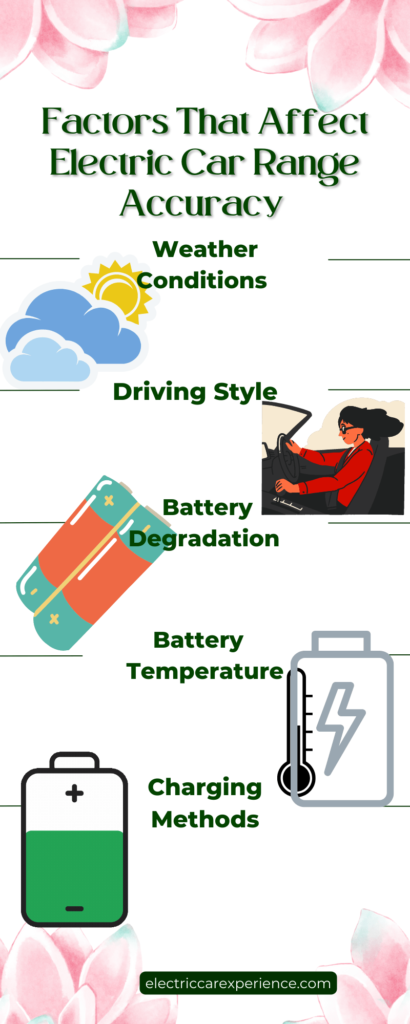
Range anxiety is a natural concern when switching from a traditional vehicle to an electric one. Then How does technology To Manage Range Anxiety In Electric Cars?
Technological advances mean you can manage range anxiety using innovative solutions like charging stations, trip planners, and battery management apps. Charging stations allow you to quickly top off your tank, while trip planners provide route optimization so you can maximize energy efficiency on each journey. And battery management apps even allow for remote monitoring of the state of charge, allowing you to stay informed wherever your travels take you.
As a result, the future of electric cars looks brighter than ever!
Range anxiety is a common concern among potential electric vehicle (EV) owners, as it refers to the fear of running out of battery power while on a trip.
This fear can hinder the widespread adoption of EVs and limit their potential to reduce dependency on fossil fuels and improve air quality.
However, with advancements in charging infrastructure, battery technology, vehicle navigation, trip planning, and government policies and incentives, the issue of range anxiety can be effectively managed.
In this article, we will explore these various technology solutions and how they are working to address the concerns of EV range anxiety.
Definition Of Range Anxiety In Electric Cars

Range anxiety in electric cars is an exciting challenge to solve. Electric vehicles are increasingly offering longer distances between charges and more charging options than ever before.
It removes the fear of being stranded with a dead battery in the middle of nowhere.
Automakers use advanced technology like regenerative braking, improved battery materials, and energy-efficient heating and cooling systems to minimize energy usage and maximize range per charge.
With more charging infrastructure being built every day, more people will feel secure when driving their electric cars without worrying about running out of power on the way.
Range anxiety in electric cars refers to the fear or concern experienced by drivers of electric vehicles about the limited range of their vehicle’s battery and the possibility of running out of power before reaching their destination or finding a charging station.
This fear is due to the limited driving range of EVs compared to traditional gasoline-powered vehicles and the relatively low number of charging stations in some areas.
The goal of reducing range anxiety is to give drivers the confidence and peace of mind to travel long distances in an electric car without worrying about running out of power.
Importance Of Addressing Range Anxiety For The Adoption Of Electric Cars

Addressing range anxiety is crucial for the widespread adoption of electric cars.
If potential electric vehicle buyers are concerned about the limited range of their car’s battery, they may be discouraged from purchasing an EV.
It, in turn, limits the growth of the electric vehicle market and slows the transition to a more sustainable, low-carbon transportation system.
| 1. | Increases consumer confidence | Addressing range anxiety can increase consumer confidence in the capabilities of electric vehicles and encourage more people to switch to EVs. |
| 2. | Boosts EV adoption | By reducing range anxiety, more drivers will feel comfortable purchasing an electric vehicle, which will help increase the number of EVs on the road. |
| 3. | Supports sustainability goals | Increasing EV adoption is essential to reducing carbon emissions and improving air quality. Addressing range anxiety can play a critical role in achieving these sustainability goals. |
| 4. | Promotes innovation | Addressing range anxiety will drive investment and innovation in battery technology, charging infrastructure, and vehicle navigation, leading to further improvements in EVs. |
| 5. | Supports government policies | Several countries have established challenging goals for EV adoption. Taking care of range anxiety can complement these strategies and assist reach these objectives. |
| 6. | Improves customer satisfaction | By addressing the concerns of range anxiety, EVs can become a more practical and appealing option for everyday use, resulting in improved customer satisfaction. |
By addressing range anxiety through technology solutions, governments, and car manufacturers can make electric vehicles more appealing to the general public and increase their adoption rates.
“Building a practical and dependable charging infrastructure is the only way to reduce electric car range anxiety. That goes beyond a purely technological problem.” – Elon Musk, CEO of Tesla.
Factors That Cause Range Anxiety In Electric Cars

Range anxiety is a common concern among potential electric vehicle (EV) owners, as it refers to the fear of running out of battery power while on a trip.
Therefore, understanding the factors contributing to range anxiety is essential for addressing this issue and increasing EV adoption.
Consequently, we will explore the various factors that cause range anxiety in electric cars.
| 1. | Limited driving range | The driving range of most electric vehicles is currently limited compared to gasoline-powered cars, which can cause anxiety for drivers who need to travel long distances. |
| 2. | Lack of charging infrastructure | The limited availability of charging stations, especially in rural areas or during long-distance trips, can cause anxiety for drivers who are worried about running out of power. |
| 3. | Slow charging times | The time it takes to charge an electric vehicle can be slow, which can cause anxiety for drivers who need to recharge quickly. |
| 4. | Inaccurate battery range estimates | The battery range estimates provided by some electric vehicles can be wrong, which can cause anxiety for drivers who are worried about running out of power. |
| 5. | Range anxiety associated with the unfamiliarity of driving an electric car | The lack of familiarity with EVs can contribute to range concerns for some drivers. |
| 6. | Unreliable or incomplete information about charging infrastructure | Incomplete or conflicting information about the location and availability of charging stations can cause anxiety for drivers who are worried about finding a place to recharge. |
| 7. | Uncertainty about battery degradation over time | Some drivers may be concerned about the decline in battery range over time and the cost of replacement. |
Range anxiety is a complex issue with several contributing factors, including limited driving range, lack of charging infrastructure, slow charging times, inaccurate battery range estimates, and more.
By addressing these factors, it will be possible to reduce range anxiety and encourage more drivers to adopt EVs.
Government Policies and Incentives To Manage Range Anxiety In Electric Cars
Government policies and incentives can play a significant role in managing range anxiety in electric vehicles. Here’s how:
- Tax incentives: Governments can offer tax incentives to encourage the purchase of electric vehicles, making them more affordable and accessible to consumers.
- Charging infrastructure: Governments can invest in developing and expanding charging infrastructure, making it easier for drivers to find and use charging stations, and reducing range anxiety.
- Public charging networks: Governments can also support the development of public charging networks, making it easier for drivers to find and use charging stations and reducing range anxiety.
- Educational programs: Governments can also develop programs to help consumers understand the benefits of electric vehicles and how to manage range anxiety, promoting the adoption of EVs.
- Mandates and regulations: Governments can also mandate and regulate the production and sale of electric vehicles, encouraging automakers to invest in the development and production of EVs and helping to increase the availability of these vehicles.
In conclusion, government policies and incentives play an important role in managing range anxiety in electric vehicles.
By making EVs more accessible, reducing range anxiety, and promoting the adoption of these vehicles.
By providing tax incentives, investing in charging infrastructure, supporting public charging networks, and promoting educational programs, governments can help make the transition to electric vehicles a more seamless experience for consumers.
Importance Of Government Incentives In Reducing Range Anxiety
Government incentives reduce range anxiety for electric vehicle (EV) owners. Here’s why:
| 1. | Affordability | Tax incentives, rebates, and other financial incentives make EVs more affordable, making them accessible to a broader range of consumers. It can help to increase consumer confidence in EVs, reducing range anxiety. |
| 2. | Charging infrastructure | Government investment in charging infrastructure development and expansion makes it easier for EV owners to find and use charging stations, reducing the fear of being stranded with a dead battery. |
| 3. | Public charging networks | Government support for public charging networks helps to increase the availability and accessibility of charging stations, reducing range anxiety. |
| 4. | Education | Government-sponsored educational programs can help to educate consumers about EVs and how to manage range anxiety, further reducing consumer concerns. |
| 5. | Regulation | Government mandates and regulations can increase the production and availability of EVs, increasing consumer confidence and reducing range anxiety. |
Overall, government incentives play a crucial role in reducing range anxiety for EV owners by making EVs more accessible, increasing the availability of charging infrastructure, promoting education, and regulating the industry.
It can increase consumer confidence in EVs and promote the adoption of these vehicles.
Examples Of Countries With Successful Policies And Incentives
Several countries have implemented successful policies and incentives to support the adoption of electric vehicles (EVs) and reduce range anxiety:
- Norway
Norway has been a leader in the adoption of EVs, with over 60% of new cars sold in the country being electric.
The government offers generous tax and other financial incentives for EV buyers and a well-developed charging infrastructure.
- Netherlands
The Netherlands strongly focuses on sustainable transportation and has implemented several policies and incentives to support EV adoption.
The government offers tax incentives and subsidies for EV buyers and has invested in developing charging infrastructure.
- China
China is the largest market for EVs in the world and has implemented several policies to support the industry’s growth.
The government offers tax incentives, subsidies for EV buyers, as well as funding for R&D in the EV sector.
- United States
The US has implemented various policies to support EV adoption, including tax credits and investment in charging infrastructure.
Several states, such as California, have also implemented policies and incentives to support the growth of the EV industry.
- France
France has implemented several policies to support the adoption of EVs, including tax incentives and subsidies for EV buyers and investment in charging infrastructure.
Conclusion
In conclusion, range anxiety is a significant barrier to the widespread adoption of electric vehicles (EVs).
Still, several strategies and technologies can help to manage this issue and promote the growth of the EV industry.
The development of charging infrastructure, improvements in battery technology, and accurate trip planning can help to reduce range anxiety and increase consumer confidence in EVs.
Government policies, incentives, and investment in renewable energy and energy efficiency can also play an important role in promoting the EV industry’s growth and reducing transportation’s environmental impact.
The transition to EVs is an important step toward a sustainable future.
The adoption of EVs can positively impact the environment, reducing emissions, increasing energy efficiency, and reducing dependence on fossil fuels.
In addition, by addressing range anxiety and promoting the growth of the EV industry, we can help to create a cleaner, greener future for all.
FAQ
What is range anxiety in electric cars?
Range anxiety refers to the fear or concern that an electric vehicle (EV) will run out of charge before reaching its destination, leaving the driver stranded.
Why is addressing range anxiety important for adopting electric cars?
Addressing range anxiety is important because it is one of the main factors that can discourage people from buying or using EVs. If drivers are confident that they will be able to reach their destination without running out of charge, they are more likely to adopt EVs and use them as their primary form of transportation.
What causes range anxiety in electric cars?
Factors that cause range anxiety in EVs include limited charging infrastructure, slow charging times, and a lack of accurate trip-planning tools.
Posts Related to Electric Cars and Batteries
- Tesla rattle when accelerating – complete guide
- What Is The Lifespan Of An Electric Car?
- Electric Car Law in the United Kingdom – An Ultimate guide 2024
- Tesla Model 3 SR Range
- What Is the Weight Of a Tesla Model S battery? What about in terms of volume?
- Amazing Electric Car Without Battery that will blow your mind
- Review Of Impact Of Electric Car Charging Station On The Power Grid USA – 2024 Guide
- Why Do UK Owner Pay Road Tax who Drive Electric Cars?-An ultimate guide 2024
- (2022-24) Cost of charging an electric car battery in various cities of the United Kingdom – Comprehensive Data- A complete guide 2024
- Electric Car Range Per Dollar
- Average Cost To Charge Electric Car – Ultimate And Complete Guide 2024
- What is The Advantage of Using Many Small Batteries Over Large Battery to Power an Electric Car?
- Location Of an Electric Car Battery
- Tesla Model X Battery Heater Replacement – Complete Guide 2024

